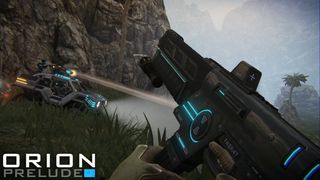If I started selling a product I'd been dreaming about making for years and everybody absolutely hated it, I'd probably flee to Tibet and join a monastery. Somehow the creators of Orion: Dino Beatdown/Prelude overcame that instinct, overhauling their tragedy into a surprising success story through three years of work. And not because they don't look good in orange robes.
You may have seen this surprisingly frank video from Spiral Game Studios, which begins with a sizzle reel full of sick burns from critics about the original version of the game and ends with a feel-good effusion of recent user reviews. It got us talking in the GR+ group chat, so I asked Spiral Games' David Prassel and Chris Gunderson what would have happened if they'd run off to Tibet with me instead (or maybe just started making a different game).
"I wouldn't like who I would have become if I started making choices like that," Prassel said. "I wouldn't be proud of the game, I wouldn't be proud of the team and the fans would remember us as the people that released 'that crappy dino game.' They would either forget about us entirely or rightfully attack any future title we would attempt to put out."
Gunderson said they probably would have moved on to a sequel instead, or a "pure multiplayer" version of what Orion: Prelude looks now, with no co-op mode, duels, or open world to explore. But it still would have been a sequel to that crappy dino game, and "it would have been difficult to stay focused, attract any new talent or have any players trust us at all." Jumping ship would have left the 45,000 people who bought Orion: Dino Beatdown when it debuted in May 2012 justifiably angry, though sales had trickled to less than 800 units three months later.
Three years later, Orion has sold more than 2 million copies, and Prassel believes it's because they spent the money from early buyers on making the game, well, actually worth buying. Permanently dropping the price from $9.99 to $.99 didn't hurt, either. He thinks the price cut was one of the best decisions they ever made, and it helped create a bigger, better player community.

But selling the game cheap isn't enough to make customers happy. That's where Prassel's call for developers to keep supporting their games, even, no, especially if they're awful, comes in.
"Both me and Chris come from a modding background and it was always 'the norm' to support your projects and community as much as you could," he said. "We were surrounded by this mentality and it just sort of rubs off on you and I am very happy that I was able to experience that culture and way of thinking.
"We've been working on this project for the better part of a decade now and watching it go from where it started to where it is now is just incredible. I don't think there has ever been anything like it and I hope it encourages developers to stick with it and I hope that it encourages fans and gamers to demand more from them."

